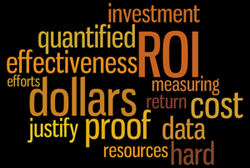Is There a Better Way to Measure ROI?

Is return on investment the only way to measure marketing effectiveness?
In marketing, we always stress return on investment, or ROI. But I recently read an article in Forbes that argues traditional ROI is no longer sufficient for evaluating your marketing efforts. To get a more accurate view, you have to move beyond the “hard” metric of money-earned-versus-money-invested, and consider “softer” metrics that aren’t always quantifiable.
The post, “Understanding the New ROI of Marketing” by Susan Gunelius, certainly got me thinking. It’s worth a read, but I’ll summarize its key points here, and add a few of my own observations.
What are these so-called “soft” metrics marketers should be watching? Let’s take a look:
Return on Impression
In its most basic sense, impressions refer to the number of customers or prospects who actually see your marketing. It’s a familiar concept in both internet marketing and traditional advertising. Knowing who’s looking quite simply tells you how far your message is reaching.
But Gunelius points out that there’s another facet to impressions: customer perceptions. After they see your marketing, what do they think and feel about your business? What do they say about it? Social media makes it particularly easy to follow conversations about your business or brand. Market research and surveys can also provide deeper insights into impressions.
Return on Opportunity
This has to do with weighing the “indirect” potential for a marketing piece against the time and resources it requires. Does the effort present an opportunity to create buzz or boost brand awareness? Can it help position your business in a way your competitors haven’t exploited? Or, referring back to impressions, does it have the potential to change the way customers perceive you? None of these can be counted in immediate dollars earned.
Return on Engagement
The term ‘engagement” gets tossed around a lot these days, especially in social media marketing, and some marketers have written it off as so much fluff. The way I see it, engagement is what businesses have been trying to do all along – create and nurture customer relationships. Content marketing, social media, customer service and even sales are just a few examples of efforts that support this.
Will your marketing strengthen your relationship with customers, which in turn encourages loyalty and great word of mouth? How are they responding to it?
Return on Objectives
Gunelius rightly notes that “not all goals are measurable with hard data.” Often you have to evaluate a marketing effort according to its effect on broader, long-term objectives.
For instance, a press release may not have an immediate financial impact. But it can be invaluable if it generates coverage that raises your profile or positions you as an authority. The same goes for web content like blog posts or case studies. You might also consider whether it’s helped reach the right audience, penetrate a new market or strengthened your positioning.
Including these new criteria may give you a clearer picture of your overall marketing effectiveness.
So what do you think? Will these “soft” metrics become commonplace, or will ROI always reign supreme?